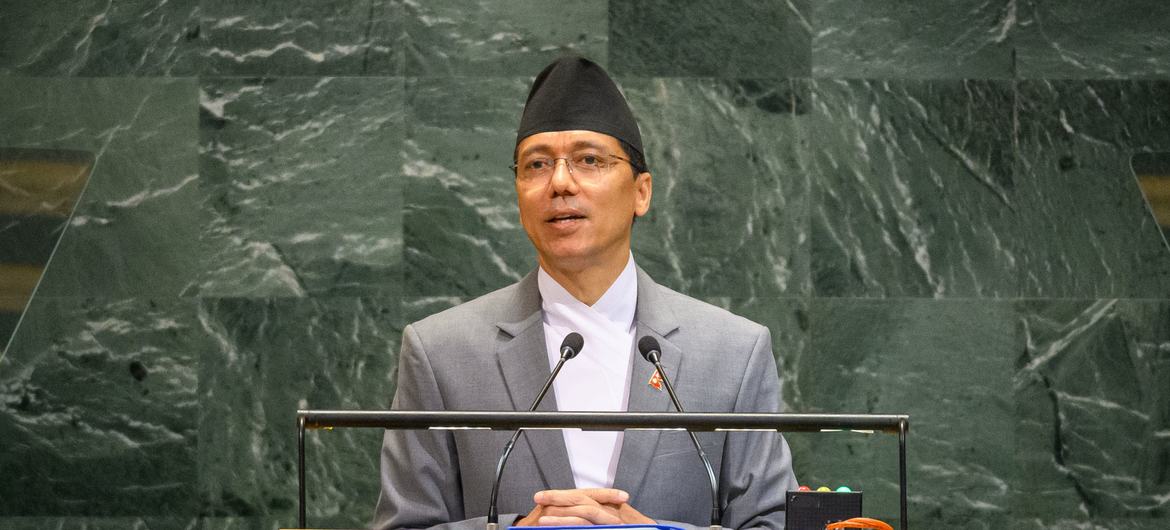
Kathmandu: Nepal’s Permanent Representative to the United Nations, Lok Bahadur Thapa, addressed the 80th Session of the United Nations General Assembly (UNGA) on September 29, emphasizing the need for global solidarity to confront unprecedented challenges while sharing Nepal’s own political transformation driven by youth movements.
Speaking under the theme ‘Better Together: 80 Years and More for Peace, Development and Human Rights’, Ambassador Thapa, who led delegation of Nepal, said the world stands at a crossroads, facing the perils of militarization, climate catastrophe, inequality, and weakened multilateralism. He urged member states to recommit to the UN’s founding values of peace, justice, and human dignity.
Ambassador Thapa highlighted Nepal’s recent political upheaval, sparked by mass youth-led protests earlier this month. “Nepali youth, particularly Gen-Z, took to the streets with a clear and compelling voice for change,” he said, noting their demands for transparency, accountability, justice, and jobs.
The movement, though marred by violence and destruction, has ushered in historic change. Nepal now has its first female Prime Minister—a former Chief Justice—leading an interim government that will guide the country to general elections scheduled for March 5, 2026. “Nepal stands at a historical crossroads. The only viable road ahead is that of peace, democracy, and inclusive development,” Thapa affirmed.
Marking 70 years of Nepal’s UN membership, Thapa underscored his country’s consistent contributions to peacekeeping, disarmament advocacy, and the promotion of rights for Least Developed and Landlocked Developing Countries. Nepal, the world’s largest troop-contributing nation to UN peacekeeping, also currently presides over the Economic and Social Council (ECOSOC).
He stressed that multilateral institutions must deliver not just promises but tangible results, warning that no single nation can solve today’s global crises alone. “Confidence in multilateral frameworks is weakening. This is a clear and urgent call to reassess, strengthen, and revitalize them,” he said.
Turning to international crises, Thapa expressed deep concern over the wars in Ukraine, Gaza, and Sudan, calling for peace, justice, and inclusive development. He reiterated Nepal’s support for a two-state solution in the Middle East and appealed for the immediate release of Bipin Joshi, a Nepali student held hostage by Hamas since October 2023.
He also condemned rising military expenditures—peaking at $2.7 trillion in 2024—while development cooperation lags, leaving millions vulnerable worldwide.
Climate change was a central pillar of Nepal’s message. Thapa described the melting Himalayan glaciers as a direct existential threat, noting Nepal’s convening of the Sagarmatha Sambaad earlier this year, which produced the “Sagarmatha Call for Action.” Nepal has submitted its third Nationally Determined Contribution (NDC3), pledging to cut emissions by 27% and expand renewable energy eightfold by 2035.
“This is not just a crisis of emissions—it is a crisis of equity, of survival, of justice,” he said, calling for scaled-up climate finance, technology transfer, and capitalization of the Loss and Damage Fund.
Ambassador Thapa called for urgent reforms of the United Nations, including a more representative Security Council, stronger ECOSOC, and revitalized Peacebuilding Architecture. He urged reforms in the global financial system to better serve the needs of developing nations.
“The global community has shown that we can achieve more when we act in genuine partnership—when collaboration triumphs over confrontation,” he concluded. “When the United Nations succeeds, humanity succeeds. Nepal stands firmly committed to doing its part.”
The address marked Nepal’s strong positioning as both a country navigating internal democratic transformation and an advocate for fairness, equity, and solidarity in global governance.